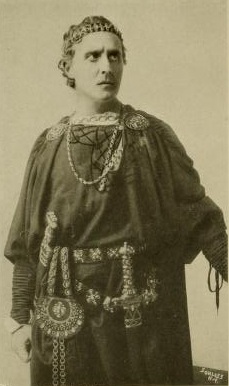| directory |
| home | contact |
|
|||||||||||||||
| search | |||||||||||||||
|
Hamlet's Soliloquy: O, that this too too solid flesh would melt (1.2) Commentary Hamlet's passionate first soliloquy provides a striking contrast to the controlled and artificial dialogue that he must exchange with Claudius and his court. The primary function of the soliloquy is to reveal to the audience Hamlet's profound melancholia and the reasons for his despair. In a disjointed outpouring of disgust, anger, sorrow, and grief, Hamlet explains that, without exception, everything in his world is either futile or contemptible. His speech is saturated with suggestions of rot and corruption, as seen in the basic usage of words like "rank" (138) and "gross" (138), and in the metaphor associating the world with "an unweeded garden" (137). The nature of his grief is soon exposed, as we learn that his mother, Gertrude, has married her own brother-in-law only two months after the death of Hamlet's father. Hamlet is tormented by images of Gertrude's tender affections toward his father, believing that her display of love was a pretense to satisfy her own lust and greed. Hamlet even negates Gertrude's initial grief over the loss of her husband. She cried "unrighteous tears" (156) because the sorrow she expressed was insincere, belied by her reprehensible conduct. Notice Shakespeare's use of juxtaposition and contrast to enhance Hamlet's feelings of contempt, disgust, and inadequacy. "The counterpointing between things divine and things earthly or profane is apparent from the opening sentence of the soliloquy, in which Hamlet expresses his anguished sense of being captive to his flesh. His desire for dissolution into dew, an impermanent substance, is expressive of his desire to escape from the corporality into a process suggestive of spiritual release. Immediately juxtaposed to this notion, and standing in contrast to "flesh", is his reference to the "Everlasting", the spiritual term for the duality. Paradoxically, in his aversion from the flesh, his body must seem to him to possess a state of permanence, closer to something everlasting than to the ephemeral nature of the dew he yearns to become" (Newell 35). Another striking juxtaposition in the soliloquy is Hamlet's use of Hyperion and a satyr to denote his father and his uncle, respectively. Hyperion, the Titan god of light, represents honor, virtue, and regality -- all traits belonging to Hamlet's father, the true King of Denmark. Satyrs, the half-human and half-beast companions of the wine-god Dionysus, represent lasciviousness and overindulgence, much like Hamlet's usurping uncle Claudius. It is no wonder, then, that Hamlet develops a disgust for, not only Claudius the man, but all of the behaviours and excesses associated with Claudius. In other passages from the play we see that Hamlet has begun to find revelry of any kind unacceptable, and, in particular, he loathes drinking and sensual dancing. A final important contrast in the soliloquy is seen in Hamlet's self-depreciating comment "but no more like my father/Than I to Hercules" (154-55). Although Hamlet's comparison of himself to the courageous Greek hero could be devoid of any deeper significance, it is more likely that the remark indicates Hamlet's developing lack of self worth -- a theme that will become the focus of his next soliloquy. Back to Soliloquy Annotations How to cite this article: ______________ More Resources |
 More to Explore |
©1999-2021 Shakespeare Online. All Rights Reserved.